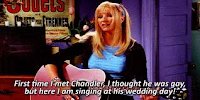 In her essay, Popular Culture and Queer Representation, Diane Raymond discusses the portrayal of homosexuality and, in particular 'queer' identities in today's media. The author describes three very important aspects of queer representation in the media: the phenomenon of the not-quite-so-gay homosexual character who exhibits very stereotypical 'heterosexual' behaviors such as Will from Will and Grace; the trope of people pretending to be gay as in the case of I Now Pronounce you Chuck and Larry (personal example); and finally, the classic case of a heterosexual character being mistaken as gay as in the famous episode of Seinfeld in which Jerry and George are mistakenly identified as gay men by a college reporter.
In her essay, Popular Culture and Queer Representation, Diane Raymond discusses the portrayal of homosexuality and, in particular 'queer' identities in today's media. The author describes three very important aspects of queer representation in the media: the phenomenon of the not-quite-so-gay homosexual character who exhibits very stereotypical 'heterosexual' behaviors such as Will from Will and Grace; the trope of people pretending to be gay as in the case of I Now Pronounce you Chuck and Larry (personal example); and finally, the classic case of a heterosexual character being mistaken as gay as in the famous episode of Seinfeld in which Jerry and George are mistakenly identified as gay men by a college reporter.The author argues that although the media has evolved to provide explicitly queer characters in television shows (much less in feature movies), these representations are not necessarily positive to the LGBT struggle for equality and acceptance in society. The presence of queer identities in the media was previously only possible if their stories were dominated by some sort of physical violence or if they were being ridiculed for their flamboyance. In the current media, these story lines have evolved to surround a kind of heteronormalization of queer identities.
 Queer characters are either portrayed to be stereotypically masculine (except for the being attracted to people of the same sex aspect) or heterosexual characters are given stereotypically homosexual attributes (except for the being attracted to people of the opposite sex aspect) or they are flamboyantly portrayed as homosexual to the point where it becomes comical. For example, the writer emphasizes the character of Will as an example of a homosexual man with strongly 'heteronormative' character traits. She also talks about his relationship with Grace and how they are portrayed almost as a married couple. She sites Chandler's character from Friends as an example of a heterosexual man with stereotypically queer traits. Finally, she uses the character of Jack from Will and Grace as an example of an overly stereotypical homosexual man. The author even makes it a point to point out that Jack's overt flamboyance is almost used as a symbol to indicate that Will is not homosexual enough and can easily be converted to heterosexuality.
Queer characters are either portrayed to be stereotypically masculine (except for the being attracted to people of the same sex aspect) or heterosexual characters are given stereotypically homosexual attributes (except for the being attracted to people of the opposite sex aspect) or they are flamboyantly portrayed as homosexual to the point where it becomes comical. For example, the writer emphasizes the character of Will as an example of a homosexual man with strongly 'heteronormative' character traits. She also talks about his relationship with Grace and how they are portrayed almost as a married couple. She sites Chandler's character from Friends as an example of a heterosexual man with stereotypically queer traits. Finally, she uses the character of Jack from Will and Grace as an example of an overly stereotypical homosexual man. The author even makes it a point to point out that Jack's overt flamboyance is almost used as a symbol to indicate that Will is not homosexual enough and can easily be converted to heterosexuality. Although I agree with the writer on each of these points, I have to argue that the representation of queer identities has evolved greatly since this article was written. Queer identities in the media today are much more relatable to both queer and non-queer audiences in the sense that they are hardly ever portrayed as caricatures anymore, but rather as 'regular' people who also happen to be queer and who are dealing with the everyday issues faced by humans and by people who identify as queer. Although I can not think of any completely realistic representation of queer identity, I am not particularly
Although I agree with the writer on each of these points, I have to argue that the representation of queer identities has evolved greatly since this article was written. Queer identities in the media today are much more relatable to both queer and non-queer audiences in the sense that they are hardly ever portrayed as caricatures anymore, but rather as 'regular' people who also happen to be queer and who are dealing with the everyday issues faced by humans and by people who identify as queer. Although I can not think of any completely realistic representation of queer identity, I am not particularlybothered since there are absolutely no completely realistic representations in the media. Shows such as Glee (with the character Kurt, among others) and South of Nowhere are leading the game in the representation of 'normal' teenagers who just happen to be homosexual. They are playing a key part in getting society to begin accepting queer folk as regular (relative term, of course) people who so happen to identify as 'queer.' The same way as heterosexual people are people first and then heterosexual.
No comments:
Post a Comment